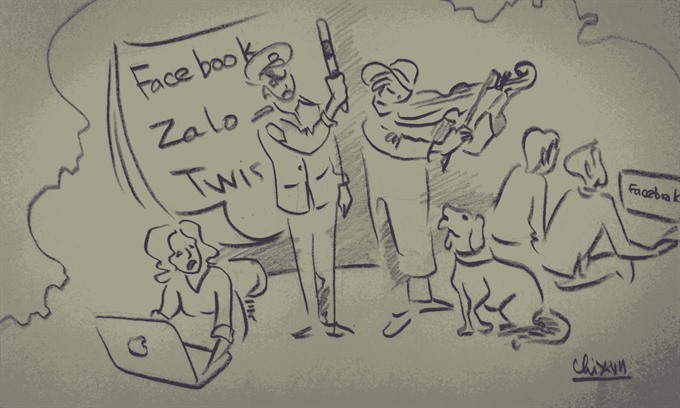 Talk Around Town
Talk Around Town

The social network may be a virtual world, but we have evidence aplenty that it can cause seriously real damage in the real world.
 |
By Chu Lan Huong
Last weekend, a Facebook rant by the mother of a 15-year-old boy against the way he was treated by the police aroused a lot of sympathy and condemnation.
She said her son was playing his violin on the pedestrian street around Hoàn Kiếm Lake, when the police rudely stopped him, because he had no permission to play music for money.
She said she could not accept the way the police shouted at him made him panic and cry.
Her post was quickly and widely shared on Facebook and other social networks, and several online newspapers published her allegations as well as the reactions of netizens, sympathising with the son’s plight and criticising the police.
However, two days later, the mother posted again, retracting her previous post and apologizing to the police for making unsubstantiated allegations. Following this, many people deleted their responses and some of the online publications deleted their stories as well.
It is not surprising that stories about the bad behaviour of public officials and celebrities gain greater traction and get strong responses from the public, mostly of stringent criticism.
But this latest episode, which is only one among many, highlights the ways in which social networks are being mined for information, superseding actual news publications.
It is sad, but true that many reporters, particularly with online publications, use Facebook and other social sites as a major source of information.
Why is this sad?
Given the preeminence of online social networks in the digital age, using them as an information source makes sense, but they cannot be treated as unimpeachable sources.
It is incumbent on any newspaper or magazine to check information carefully before publishing. Many publications have had to swallow their words after publishing wrong, even fabricated news, because they failed to crosscheck the information.
The “news” of a plane crash at the Nội Bài Airport is another example. It turned out that a Facebooker had fabricated the news to get more “likes” for her page.
In another case, a Facebooker posted pictures of a series of luxury cars carrying Government registration plates which later turned out to be model cars.
Then, just a few weeks ago, two hapless toothpick sellers were beaten very badly because people mistook them for kidnappers of children, based on some Facebook posts.
Accountability
Facebookers found posting false news can be fined.
Under Vietnamese law, the Facebooker who spread the news of the plane crash can be fined VNĐ10 million to VNĐ20 million (US$500-1,000, approximately).
But what about newspapers that re-publish information from social networks?
All the publications have had to do is take the stories off their page.
This is unfair. There should be stricter sanctions on violations by newspapers.
There is no doubt that social network has massively influenced people’s lives and society, to the extent that some people regard these as “personal newspapers”.
And there are people who think setting up accounts and posting information on social networks is their right, which they then use to fabricate news and receive more “likes.”
The social network may be a virtual world, but we have evidence aplenty that it can cause seriously real damage in the real world.
With greater freedom comes greater responsibility, as they say, and those who violate their responsibilities as public citizens should be held accountable. —VNS




